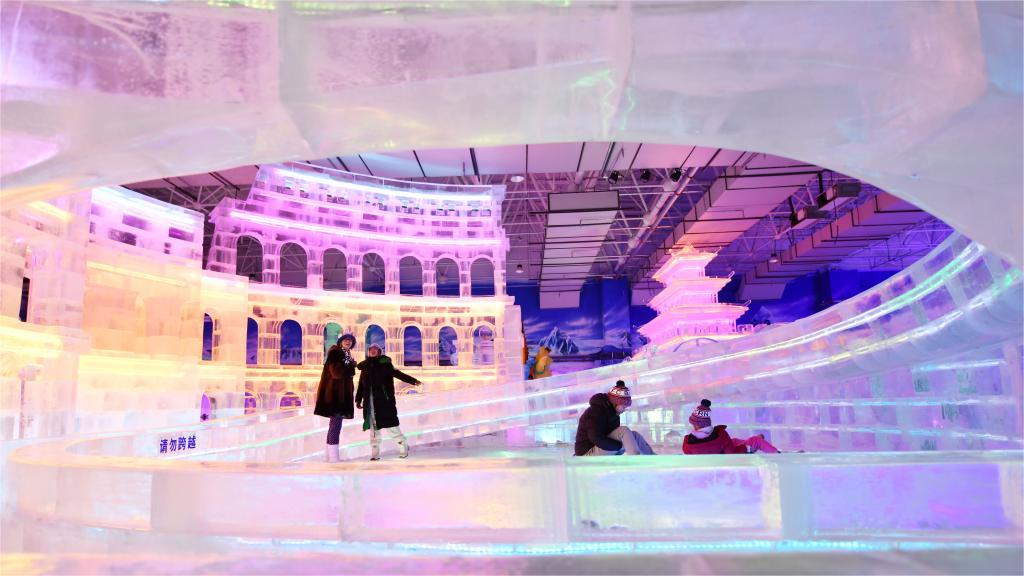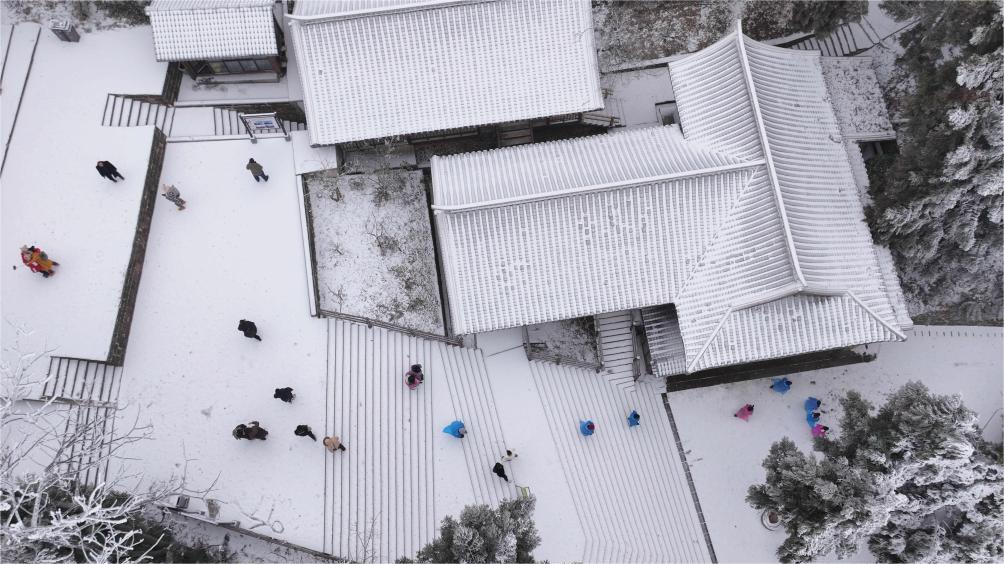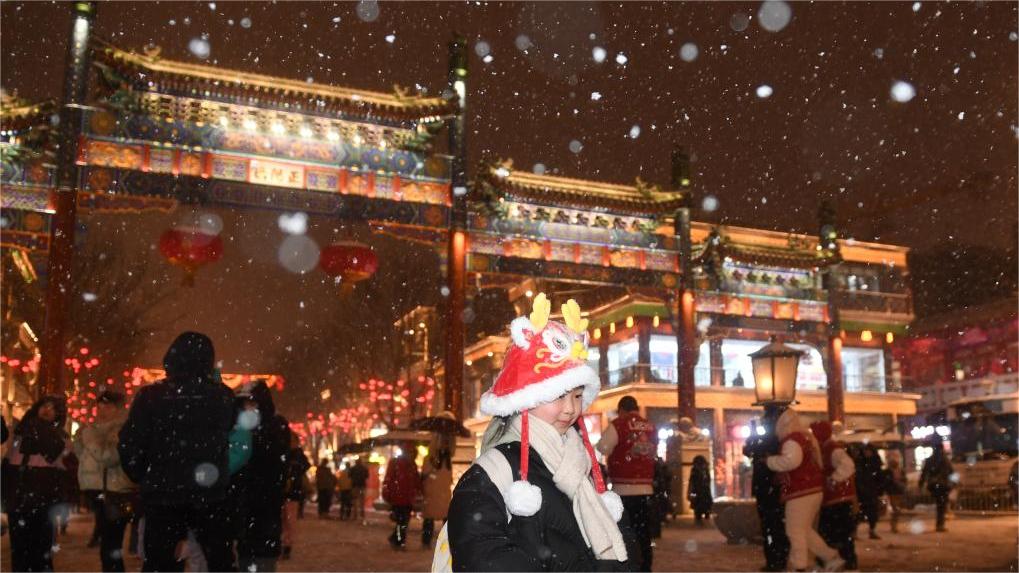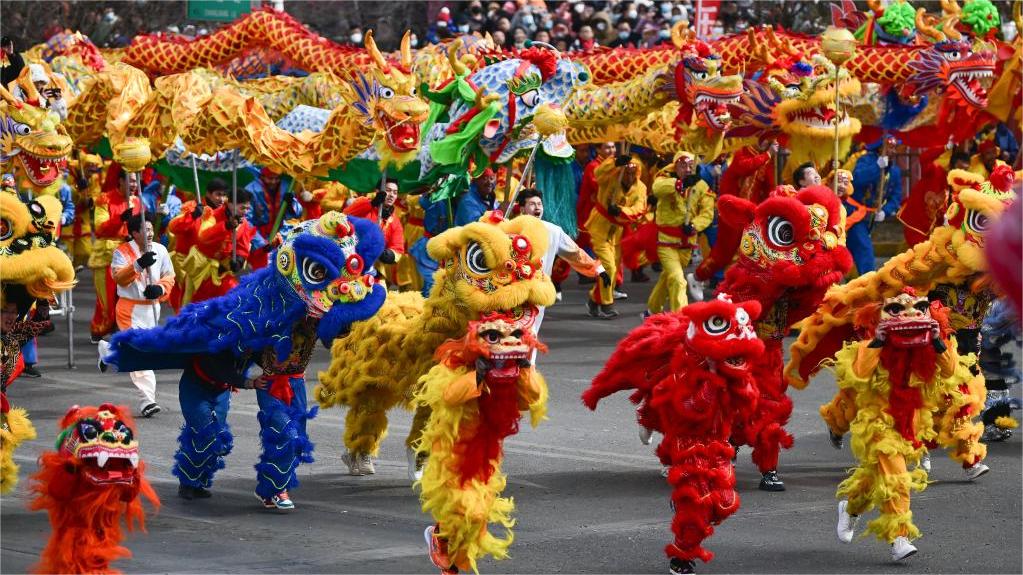Theme parks become popular choices for Chinese people
Theme parks across China saw throngs of tourists during this year's Chinese New Year holiday, also known as the Spring Festival holiday.
The Hengdian World Studios, a film and TV theme park in Hengdian town, Jinhua city, east China's Zhejiang Province, received 1.35 million tourist visits during the eight-day holiday from Feb. 10 to Feb. 17, setting a new record and ranking first among the province's commercial tourist attractions.
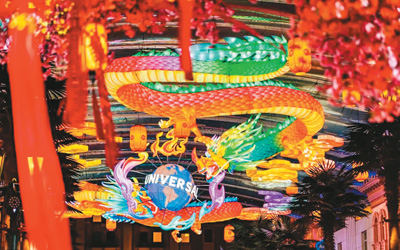
Photo shows dragon-themed decorations at Hollywood Boulevard, the Universal Beijing Resort. (Photo courtesy of the Universal Beijing Resort)
In Zhengzhou, capital of central China's Henan Province, Enjoyland International Resort, a comprehensive theme park, raked in over 100 million yuan ($13.89 million) in tourism revenue during the holiday, ranking first among the province's scenic areas in terms of visitor numbers and tourism revenue.
A report from Alibaba's travel branch Fliggy said family trips became a major travel option for Chinese people during this year's Spring Festival holiday, with bookings for theme parks, children's parks and other attractions increasing over 10 times year on year.
Booking data from multiple travel platforms showed that those for parent-child trips accounted for more than half of the total during the just-concluded winter vacation, with theme parks being one of the most popular choices.
Industry insiders believe that theme parks can provide entertainment, stage shows, landscapes, facilities and other tourism experiences, as well as relatively comprehensive dining and accommodation services, meeting the diverse needs of family trips. Theme parks are ideal for family trips for travelers who want to reunite with family and spend the holidays at the same time.
The Universal Beijing Resort launched its themed event, Universal's Chinese New Year, which features dragon-inspired Chinese New Year decorations. During the event, Universal's Nian Show 2024 takes the stage, with characters in blockbusters like "Minions," "Madagascar," and "Kung Fu Panda," presenting the thrilling Chinese tale of the beast Nian (year in Chinese), an evil creature from Chinese legend.
"We add iconic elements of Chinese art to our show, integrating art forms such as Chinese dance, folk music performances, acrobatics, lion and dragon dances," said an executive of the Universal Beijing Resort's entertainment team.

Tourists visit the Harbin Ice and Snow World in Harbin, capital of northeast China's Heilongjiang Province. (People's Daily Online/Sun Lijun)
Lin Huanjie, president of the Institute for Theme Park Studies in China, said that against the backdrop of the integration of culture and tourism, theme parks will highlight their cultural attributes in addition to entertainment.
International theme parks like Disneyland and Universal Studios are not just amusement parks, but also serve as bridges for cultural exchanges. Thoughtfully designed festival activities are indispensable for these theme parks to continuously attract consumers and localize their operations.
Theme parks of different styles have made tourist destinations more popular. The Harbin Ice and Snow World, a renowned ice-and-snow theme park in Harbin, capital of northeast China's Heilongjiang Province that attracted swarms of visitors, officially closed for the season on Feb. 16. The theme park received 2.71 million visits during the 61-day operation. It was officially crowned the world's largest ice and snow theme park by the Guinness World Records, contributing to the winter travel boom in Harbin.
Official data showed that the top five attractions by tourism revenue in Henan Province during the Spring Festival holiday were all theme parks. In the first seven days of the holiday, Zhongmou county in Zhengzhou city, home to eight different theme parks, received more than 3.4 million tourist visits and generated over a billion yuan in tourism revenue.
Large resorts and theme parks like Disney, Universal Studios, Fantawild Adventure, and Happy Valley, as well as various amusement parks in smaller cities and rural areas, provide tourists and citizens with richer choices for spiritual and cultural life during the holidays, said Dai Bin, president of the China Tourism Academy.
Theme parks are becoming an important force in promoting the diversified development of local economy and cultural consumption, enriching the cultural and entertainment experiences of people while having positive impacts on local cultural and tourism resources, Lin said.
Photos
Related Stories
- Wenchang in S China's Hainan pushes forward aerospace-related tourism
- Tourist industries tap into lures of culture
- Top China travel destination makes bid for U.S. tourists
- China's thriving outbound tourism contributes to global economic recovery
- Litang in SW China's Sichuan province finds secrets to tourism
Copyright © 2024 People's Daily Online. All Rights Reserved.






